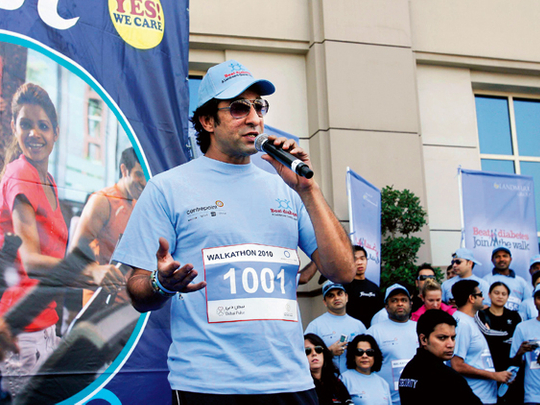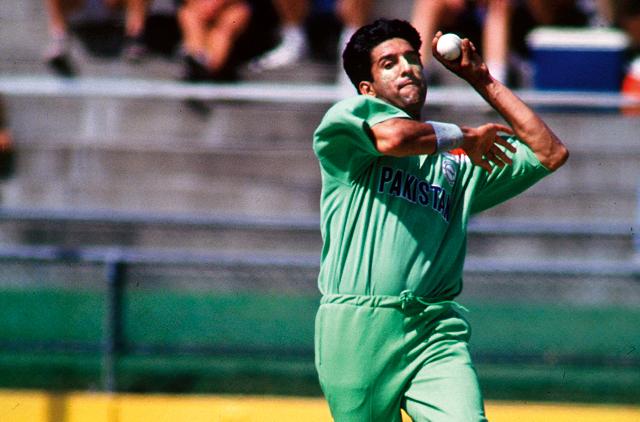
"I was devastated!" exclaims Wasim Akram, former captain of the Pakistan cricket team and holder of two world records. His eyes grow almost as large as the designer sunglasses he's sporting as he describes his reaction on discovering that he had type 1 diabetes 16 years ago at the age of 29. "My first instinct was to go into hiding," he says.
Today, Wasim knows that's how most people react when they first find out they have type 1 diabetes, which usually strikes at a young age and involves taking insulin injections every day. "I discovered that I had diabetes when my father forced me to consult a doctor as I had been feeling uncharacteristically tired fthor quite a few days," he explains. "It was a huge shock because at that age you think you're invincible! It took me three and a half months to come to terms with it, especially since there was no known reason for why I developed diabetes."
Once he'd got his head round it, Wasim discovered another facet of the condition. "The more I accepted it, the better my health became emotionally and physically," he smiles. "That's when I learnt that acceptance is the first step to conquering diabetes, like any other problem in life. Only after acceptance of your condition can any treatment take effect."
But the going wasn't easy. "I struggled for a month because my sugar levels were going up and down like a yo-yo. However, I managed to bring my diabetes under control with exercise and diet," he says. "I learnt a lot more about my body. I saw that my blood sugar levels shot up whenever I was stressed. I learnt to monitor my blood sugar levels, and find ways to control it. But even now I have to inject myself with insulin three times a day."
Wasim - who met with Friday at the Address Hotel Downtown in Dubai after flying in to participate in Landmark Group's ‘Beat Diabetes' walkathon on November 18 - was one of the top international cricketers at the time of his diagnosis. He drew crowds wherever he played and was a powerful role model to his legions of fans. "Once I'd made up my mind that I wanted to continue playing cricket, I just did what I was advised to by my doctors and went back to play for Pakistan," he says. "I played for another nine years before I retired."
Raising awareness
Wasim's goal today is to raise the profile of diabetes as a serious but controllable condition. "The problem is the lack of awareness about this disease," he says. "I'll walk any mile, go to any country to raise awareness. If even one person is detected with diabetes at an early stage because I've highlighted it, it would be worth it because that person will be able to lead a normal life."
Wasim believes that increased awareness of the condition and the methods of managing it will help other sufferers. "I have seen the way people react when they are diagnosed with diabetes," says Wasim. "If children have it, their parents are deeply disturbed and this, in turn, stresses the child, who cannot then deal with it. Parents should be well-informed so they can keep calm and support their kids. Parents must have enough knowledge to be supportive and positive at the same time."
He is also keen to fight the social stigma attached to diabetes in many countries in southeast Asia. "Women with the condition can find it difficult getting a partner in some areas. When I heard that I realised that there was no point in hiding the fact that I was suffering from diabetes from the world. I can say that I started the trend among public figures there of openly admitting to having this condition."
Following his retirement from international cricket, Wasim has taken part in many profile-raising charity events, including Landmark Group's ‘Beat Diabetes' walkathon in Dubai this November. "I want everybody to know the effects of diabetes, and what better way to do it than through walking - the primary exercise prescribed for diabetics?" he says.
This year's Dubai walkathon drew close to 12,000 people and Wasim has led and taken part in many other walkathons all around the world over the last few years. Dubai, though, is particularly close to his heart.
"I participated in Landmark's diabetes walkathon last year, and was very impressed," explains Wasim. "I was only too happy to accept when they invited me again this year. Dubai has always been important to me since my cricketing days."
Since being diagnosed Wasim has also tied up with pharmaceutical company, Roche, to participate in seminars, visit hospitals, and spearhead diabetes awareness campaigns.
Inspiring others
Like most people diagnosed with a life-altering condition, Wasim at first leaned on his family and friends for support.
His wife, Huma, was instrumental in the process of him coming to terms with the condition. "She was a psychologist and she helped me understand all the various aspects of diabetes and that, with treatment, by controlling my blood sugar level and by exercising, I could lead a normal life," he says. "Cricket was my job, so I was already exercising and fit. I kept wondering why it had happened to me. After a few months I accepted that it was with me for good, but I was determined I wouldn't let it win. I decided I had to live, so I might as well live healthily." This started the duel with diabetes that he's since been fighting every day of his life.
His wife's untimely death due to multiple-organ failure in 2009 dealt another huge blow for Wasim. But he soldiered on, motivated by the realisation that his two kids, Taimur and Akbar, now depended on him alone. "I want to be around for them," he says.
There's no room for self-pity with diabetes says Wasim. "You have to be constantly monitoring yourself, nobody else will," he advises. "You have to take care of yourself. There's no point blaming anyone else. Be organised and just follow your routine. It's all about being in careful of your blood sugar, your diet, your exercise - that will leave you in control."
Despite his evident willpower, Wasim still notices the sacrifices he has to make. Like most Pakistanis, Wasim likes spicy food such as biryani and he has a sweet tooth. "I'd love to wolf down biryani everyday," he smiles. "I just love sweets. But I can't have them, and that's the toughest thing where diet is concerned. Of course, I do have a little once in a while, but it's hard when you have to give up something you just love!"
Routine discipline
Although Wasim's routine may sound punishing, he says it has relaxed since his professional cricketing days. "When I am in Pakistan I've nothing much to do. I drop my kids to school and pick them up, but otherwise I have plenty of time for my exercises. I go to the gym in the morning, for a run in the evening, six days a week, wherever I am. That and my diet keeps sugar levels under control."
But it is an ongoing struggle: "There are days when I feel like taking a break from my daily exercise routine. I feel like lying in or spend some hours watching television. But that's a luxury I can't afford. I have to lose a certain amount of calories every day. If I accumulate calories my blood sugar level will increase. If I don't feel like going to the gym, I'll run in my garden. I have to burn those calories. I have certain rules and goals for myself. I do break them occasionally, but never let it go out of control. I'm in control 99 per cent of the time." His continued effort is paying off: "I'm 45 now, I had my last test two weeks ago and everything's fine," he smiles. "So I know I am doing something right."
Wasim hopes that his own example of perseverance will inspire others.
"I meet patients in hospitals wherever I go to motivate people. I take my shots of insulin in front of them, eat with them, and generally boost their morale. I hope to motivate youngsters to adopt a healthier lifestyle. I want to show them it's normal to have this condition."
To anyone sceptical of being able to live a normal life with diabetes, Wasim's answer is simple: "I took 250 wickets after I was diagnosed with diabetes. You think you can't beat it?!"
Types of diabetes
Type 1 diabetes, sometimes called insulin-dependent, immune-mediated or juvenile-onset diabetes. Caused by an auto-immune reaction where the body's defense system attacks the insulin-producing cells. The disease can affect people of any age, but usually occurs in children or young adults. People with this form of diabetes need injections of insulin every day to control the levels of glucose in their blood.
Type 2 diabetes, sometimes called non-insulin dependent diabetes or adult-onset diabetes. Accounts for 90 per cent of all cases of diabetes. Can remain undetected for many years and the diagnosis is often made from associated complications or incidentally through an abnormal blood or urine glucose test. Often, associated with obesity, which itself can cause insulin resistance and lead to elevated blood glucose levels.
Gestational diabetes (GDM). Occurs with high blood glucose levels during pregnancy. Usually disappears after pregnancy but women with GDM and offspring are at an increased risk of type 2 diabetes later in life.
Source: International Diabetes Federation
Wasim's record
Wasim Akram is regarded as one of the best fast bowlers in the history of cricket. Known as the Sultan of Swing for the way he gets the ball to swing, he's taken an impressive 881 wickets in first-class cricket. He's second only to Sri Lankan off-spin bowler, Muttiah Muralitharan, in terms of One Day International (ODI) wickets, with 502. He is said to have devised the reverse swing bowling technique. He was the first bowler to reach the 500-wicket landmark in ODI cricket during the 2003 World Cup. In 2002, the cricket reference book, Wisden, released its only and final list of best players of all time: Wasim was ranked as the best bowler in ODI with a rating of 1223.5, ahead of Allan Donald, Imran Khan, Waqar Younis, Joel Garner, Glen McGratt and Muralitharan.
Inside info
http://www.idf.org/types-diabetes



